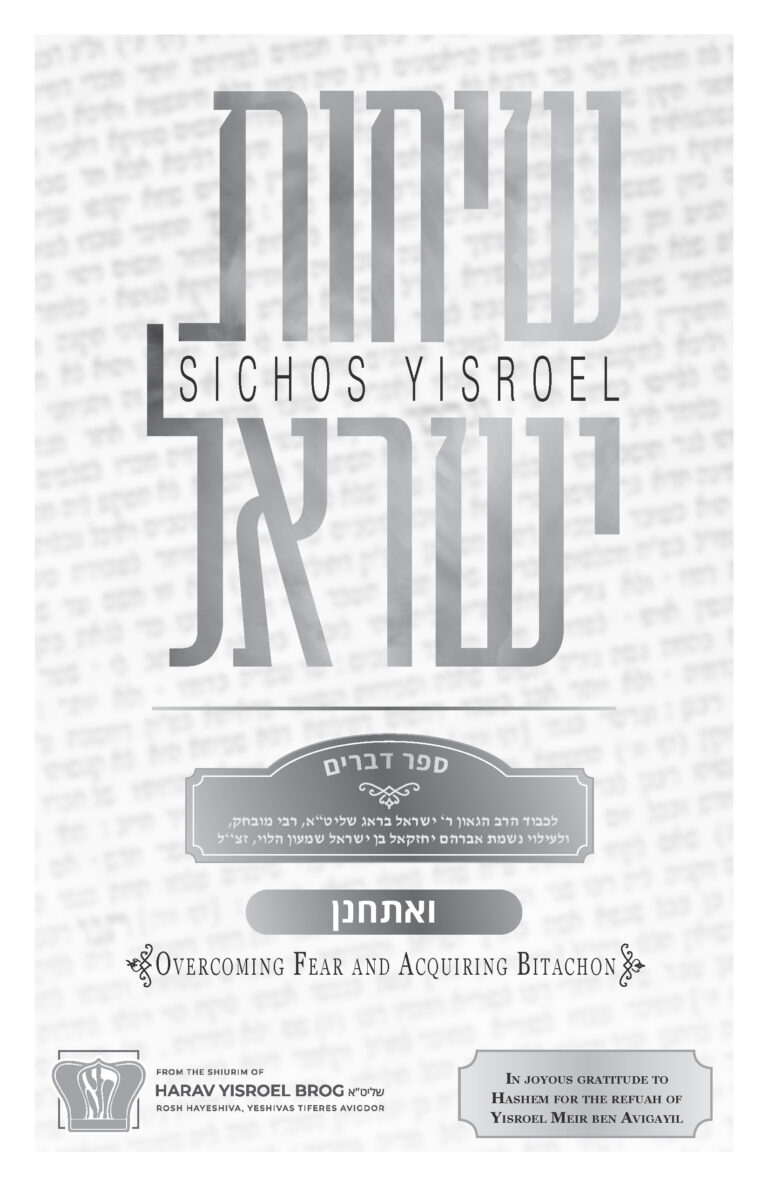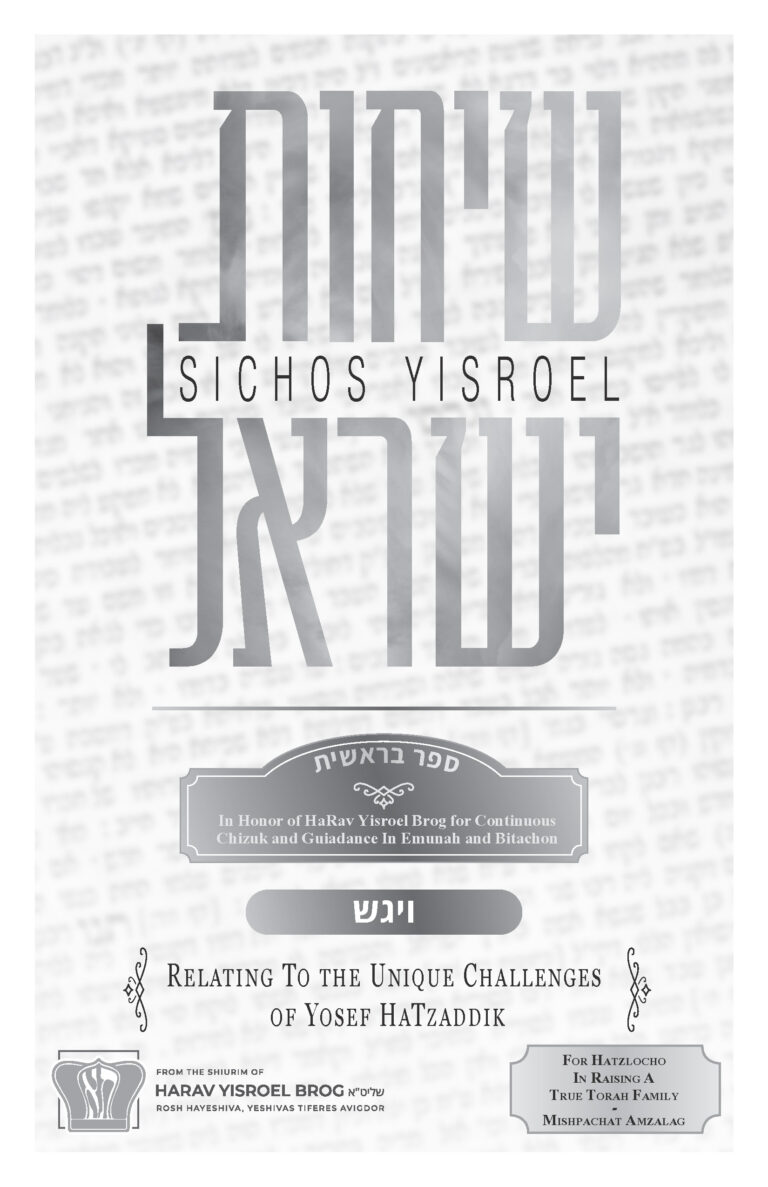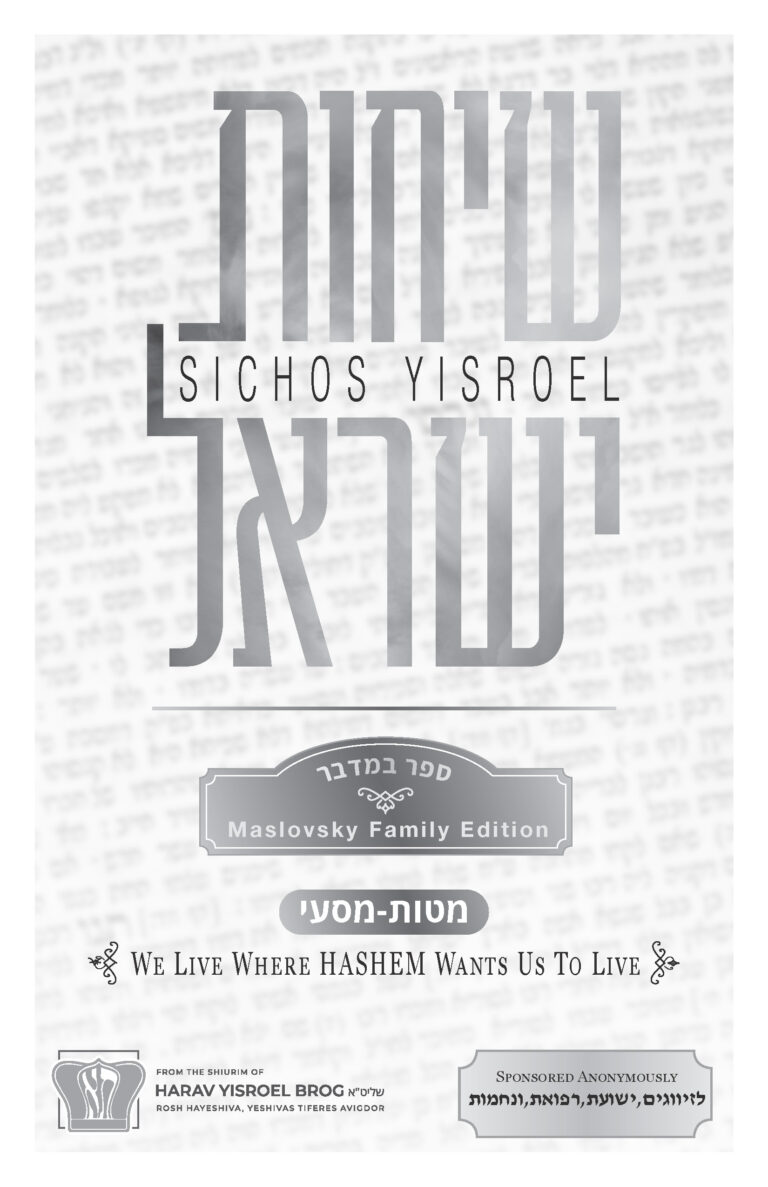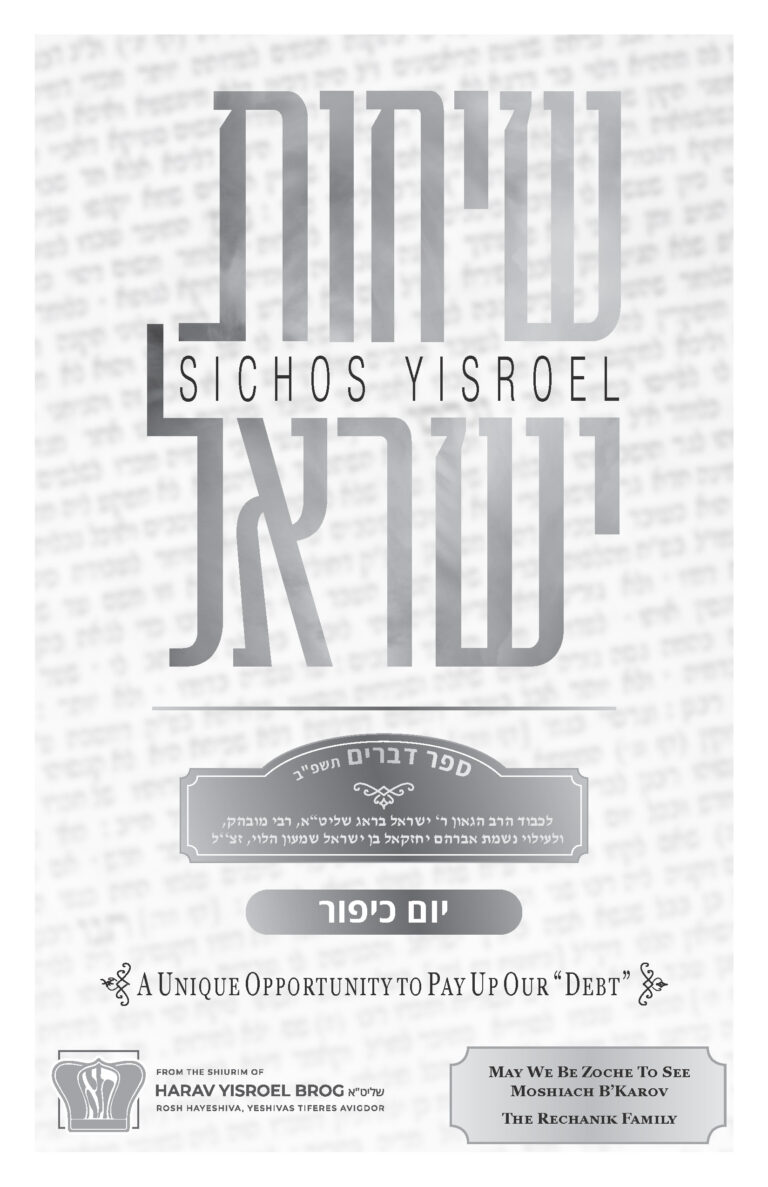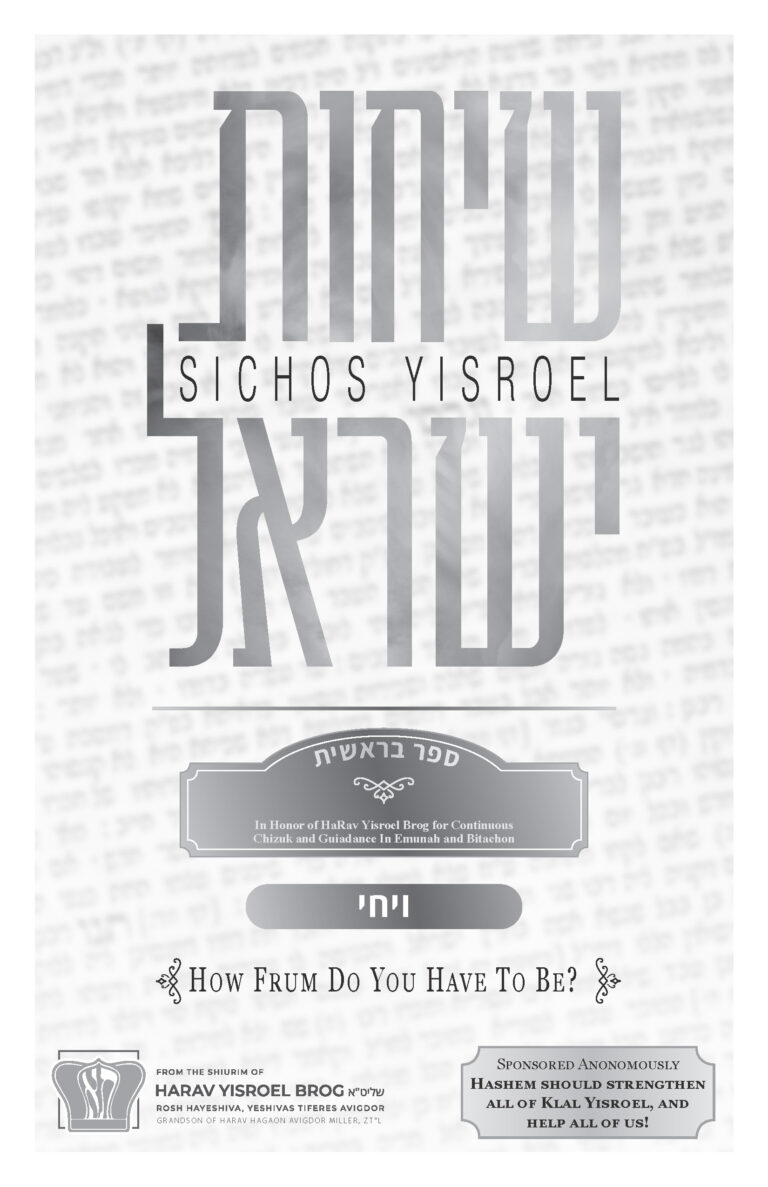Shelach 5782 – Are You Standing Up For Hashem
Sponsored Anonymously in Honor of Yaakov Gutkin & Eli Rechanik
Consider sponsoring a shiur
Visit YTATorah.org
Shiur presented in 5779
Kalev’s Protest
In this week’s parshah, the Torah tells us how the meraglim returned from their tour in Eretz Yisrael and brought back a bad report. Initially, they were very diplomatic; they didn’t say it openly. What they did, was they hinted to it. They spoke about the strength of the great nation that was in Eretz Yisrael. They compared their strength to that of Klal Yisrael. But anybody who could add one plus one would have asked themselves, “What chance do we have against such odds?” In this way, the meraglim created a feeling that it was a helpless matzav. And then as the meraglim went on, they saw that the Am Yisroel was catching on to their gist. They saw that Am Yisroel was sitting on the edge of their chairs and saying, “Yeah, yeah. What else, what else you’ve got to say?” Instead of the Am Yisroel telling the meraglim to keep quiet, or saying, “We don’t want to hear such narishkeit! You are shakranim,”they were taken in and went along with them. The meraglim saw that Am Yisroel was being drawn into their net. So now they got themselves a little bit of chizuk. They weren’t afraid of Moshe and Aharon. And they openly declared לא נוכל לעלות – we cannot ascend, there’s no way, כי חזק הוא ממנו – for it is stronger then Him (Bamidbar 13:31). And in the end when they walked away and they spoke to the am alone, they had even bigger chutzpah. They said a bunch of sipurei sheker about Eretz Yisrael with all types of guzmaos, exaggerations, to make the situation look even more helpless.
Now, when people started to absorb their message and they began to complain, and murmuring started going through the crowds, ויהס כלב את העם אל משה – Kalev stilled the people (Bamidbar 13:30). Kalevwas one of the meraglim and he gave a shrei and said, “Sha!” He was mashtik everybody. He told them to zei shtil. And then he said, “Let me tell you something about Moshe.”[i] He understood that he had to talk diplomatically now, so he played the professional game, and asked them, “Is that the only thing that Moshe Rabeinu did to us?” So everybody who heard him say those words thought, “Ah, here comes some good lashon hara about Moshe Rabeinu! Yeah, yeah, what do you have to say?” And Kalev said, “He took us out of Mitzrayim, he made krias Yam Suf for us. He brought down the mann. He brought us the slav. And you don’t trust him?!”
Now, when Kalev gave this public display of protest in face of what the other meraglim were saying, was his protestation accepted? Did anybody listen to Kalev and accept what he said? No one listened to him. No one accepted anything Kalev said.
If somebody would come and ask you what’s your perspective on what Kalev did, what would you say? As we know, in the upcoming parshah, Pinchas made a public protest, a very radical protest and speared a couple on a sword. But that protest had a tremendous effect because Yidden were in the midst of a mageifah, plague, which was stopped. But if Kalev came to you and said, “What do you think I should do right now? Does something need to be said?” What would you have said? “It’s not going to help. You’re not going to stop it. You might get killed!”
Hashem Values a Protest
This is a very big controversy that we often face in our lives. We encounter reshaim. We encounter leaders of different groups of Jews who are misleading many Jews. And the question is, should we protest or should we just hunker down and strengthen our own forts? We hear the following all the time: “Are you really going to change the world? Do you really think you’re going to make a difference? They’re not going to believe you. You’re going to be a lone voice in the wilderness.” But we must know that you have to look for a precedent in the Torah. So you may hear of a group of Jews who get up and decide to bring in some foreign ideas into Yiddishe education. We see a lot of these things in our lives. Do you protest or not?
I remember in New York City, at one point they were legalizing toeivah and they wanted everybody to be mechabed and acknowledge whatever type of lifestyle a person chooses – even one that the Torah calls an abomination. What’s interesting, is that most of the Torah world did not say “boo” about it. The rabbanim didn’t say anything about it. I’m sure they felt, “What does it have to do with us? We know it’s an abomination.” And my grandfather (HaRav Avigdor Miller, zt”l) was a lone voice. He stood up and he protested, he went into the street and he protested, and he told people to write letters about this abomination to their elected officials and not to be accepting of it.
A rosh yeshivah said to me at the time, “Does he [your zeida] think he’s going to accomplish anything? Is anybody going to listen to what he says?” I said, “I hear you. I hear your point.” I was young then, very young and dumb. I should have told him, “Didn’t you learn the parshah of the meraglim? Do you know what Hashem’s response was to Kalev?” If you look in the chumash you don’t see anything. But if you take a look in the medrash (Bamidbar Rabbah 16:2) on this passuk it says as follows: אמר לו הקב”ה למשה טובה גדולה אני מחזיק לו, I’m very indebted. I owe him [Kalev] a big tovah, שנאמר, as it says they all were against me זולתי, besides, Kalev ben Yefunah.[ii] Unbelievable! Hashem said, “Kalev did more for Me than gantz Klal Yisrael did for Me.” That’s what it says in the medrash. And you look at this medrash and you say, what’s going on over here? Kalev didn’t do anything. What is Hashem saying he did more for Me than ששים ריבו מכם, more than gantz Klal Yisrael? Not only that. Do you know they wanted to kill him? They wanted to stone him when he said his thing.
We learn a powerful lesson from medrash. Hakadosh Baruch Hu values a macha’ah, a protest. Even though more often than not,it doesn’t seem to help at all. It seems it won’t do a thing. But it does make a roshem. Even if no one else notices, it makes an impression on Hashem, because it shows that you care, at the very least, about Hashem’s kavod. At the very least!
In Defense of Marriage
I once asked my grandfather this question: “Why are you shrei’ing about the toeivah? Why are you against the democrats? Why are you pro Nixon?” (He was pro Reagan during the 1968 Republican primary). In those days, many Yidden believed that the democrats were better for yeshivos. Most of the rabbanim at the time were also democrats because the party was for the yeshivos. The Democrats gave money to Israel. The Democrat party, before they became anti-Semitic, used to be very pro-Israel. A very big rosh yeshivah asked me why my grandfather had the approach he had. I told him, “I don’t know. I’ll ask my grandfather.” And I asked him.
My grandfather was not pleased by the question. He said, “You think that it makes a difference to me if it is that goy or this goy? You think a goy makes a difference to me? Are you out of your mind? Somebody suspects me of being against democrats and pro-republican because of what good I’m going to get from them or how they’re going to help Israel?! I have one cheshbon and that is that republicans still believe in marriage with a man and a woman, and the democrats want to force us to accept alternative lifestyles!” Today they call it letters: A, B, C, D, E or GTV or something like that. Strange names they call it. That means weirdos. And my grandfather said, “You know why I’m against them? Because Hashem said – ‘That type of lifestyle I consider abominable.’ Now if Hashem thinks somebody is abominable, you think I’m going to go on and do nothing about it?! You think that I’m going to close my eyes and ignore it?! Hashem says it’s an abomination to Me! The very least I can do is get up and say, ‘Yes, that’s an abomination.’ The only side I’m on is Hashem’s side! That’s the side that I’m on. And as far as the money for the yeshivos, Feh,” he said. “Hashem is זן ומפרנס לכל, not the Democrats. I never heard such a thing in my life. Democrats give money to yeshivos? Democrats support yeshivos?! The Ribono Shel Olam is not mefarnes Am Yisrael?!”
“Taking the Stand”
That’s how people felt back then, chashuve people. Look, it could happen. In the time of the meraglim, Kalev was the only one. Even Yehoshua didn’t shrei! And Hashem said about Kalev: טובה גדולה אני מחזיק לו. My zeida never cared about any kavod he got from people or how it looked. I’ll tell you an amazing story. My zeida was at an official function – a dinner of a big organization, a large Jewish organization. They have a lot of shuls around the world and they honored an honoree by the name of “Louie.” That was their guest speaker, Louie the guest speaker. And this guy started to speak terrible things against the Torah and the yeshivos, and he said this organization which was hosting the dinner represented “a new Jewish world order.” The new Jew. We’re no more the ghetto Jew. We’re no longer bent-over uneducated poor Jews, or Jews who are just immersed in our holy books. Today, we’re the people of the book, educational books. Today we’re the new Jew.
My zeida said he was sitting at the table listening to this guy and he said, “My blood started to boil. ‘There’s no place for yeshivos in the future of America,’this fellow said. On my table,” my grandfather said, “were the rabbanim with the longe beards, ones who spoke mainly Yiddish and they were all silent.” I said to them, ‘Rabbosai, mir darf moicheh zein, we have to protest.’ They said, ‘No, no, no. Not at the dinner. Please! It’s not the place for this.’” But the guy wasn’t keeping his mouth quiet and he kept his tirade up and my grandfather said, “I’m going.” He removed his glasses, he told me, and put them in the pocket of his kapote. “The two rabbanim, on both sides of me, grabbed my arm, one from this side and one from this side to keep me from going up. I turned to them and said, ‘Either both of you are going with me or I’m going by myself!’ They saw I meant business. So I ended up going by myself. They didn’t want to join me.” My zeida walked up to the dais and he taught this guy an unforgettable lesson.
“Remember Louie!”
My grandfather told me, “I want you to know that part of my motivation to do it was because I had a tzava’ah from the great gaon and tzaddik Rav Aharon Kotler.” Rav Aharon Kotler, zt”l, lived in Brooklyn and he would travel to Lakewood. At the end of his life my zeida went to visit him. Rav Aharon told him, “Remember Rabbi Louie. Remember Rabbi Louie. Zachor!” Why? Rav Aharon said, “When I started my yeshivah, I went to all the rabbanim in New York and I said to them, ‘You’ve got to help me out. One Shabbos a year – please do an appeal, epes. I don’t care if it’s an empty Shabbos. You have to help me build Torah in America.’” This guy, this Rabbi Louie – who at that point also had a Jewish name which was given by his bris – said to Rav Aharon the following: “I’m not giving you one piesta (penny) – you’re not getting one penny from me until you change your ways. Bis du bais deine derachim.” Rav Aharon told my grandfather, “He was the only one who wouldn’t help me out. Remember him, gedenk.”
My grandfather made a joke. He said, “It reminded me of the tzava’ah that Dovid Hamelech gave Shlomo to remember Shimi ben Geira. I forgot about it. And now I’m sitting by this dinner and here’s Rabbi Louie spouting nonsense in front of the whole tzibbur and instead of el Moshe it’s al Moshe. He was spouting nonsense on top of the Torah and on top of Moshe Rabeinu! That caused my blood to boil!” So he went up and shushed him.
I asked my grandfather when he told me that story, “Zeida, weren’t you embarrassed?” I’ll never forget what he answered me. In Yiddish he said to me, “Imagine if you would see your mother at the bottom of the steps, in front of your house, and two goyim were standing over her and assaulting her and you’re watching from the window. What are you going to do? Close the shades and go back to the kitchen? You don’t think at that time. You open the front door, you run down the steps and you jump on the matzav. Take a few blows! You won’t have time to make cheshbonos!”
Screaming “Shabbos” in Yerushalayim
Rabosai, you have to know that in America this is a major problem. Now, the reason is because we don’t care about the kavod of Hashem. In America, we believe in “Chill out and MYOB” (Mind Your Own Business). If they’re not bothering you, don’t bother them. The point is – it’s a chillul Hashem. Does it bother you?
I’ll never forget the first Shabbos that I came to Yerushalayim Ir Hakodesh as a bachur. I was walking on the top of Rechov Strauss, where it meets Rechov Bnei Bris. That’s a block away from Rechov Hanevi’im where the cars would still drive on Shabbos. I was only a block away and I saw a light green Volkswagen Bug come behind a fence, behind a barrier. It was early, 8 o’clock in the morning, Shabbos morning and this guy was coming and he realized maybe it wasn’t such a good idea so he started making a U-turn, and some Yid behind me gave a bloodcurdling scream: “SHABBOS!” I jumped. I didn’t know what the guy was doing. I didn’t know what happened. It was the first time I had ever heard such a bloodcurdling scream. I turned around and I said, “Good Shabbos to you too. What is this? Vus is dos?” So he starts to point at that car. I looked and I said, “What’s it your business what this guy is doing?Is the guy bugging you?! He’s not bugging you! He’s not running you over! What are you screaming for?! So he said, “Shabbos. Dos is an unzere. It’s one of us.” I waved my hand like this, and went to shul to daven. The whole day, I figured this guy is mamash a real radical.
On Motazei Shabbos, I went up to my rebbi (HaRav Meir Soloveichik, zt”l) and I presented him with the story. I said, “Rebbi, who was right? Was I right or was that meshugene right?” He said, “He was right.” I said, “What do you mean he was right? It wasn’t his business. Who was bothering him?” He said, “The guy was mechallel Shabbos befarhesia.” My rebbi told me, “You come from America. Shabbos means nothing to you. Your relationship to Shabbos is meaningless. Shabbos doesn’t represent Hashem or Hashem’s kavod. However, that guy sees somebody being mechalel Shabbos, and he can’t take it.” He gave me a mashal. He said, “Imagine you would see somebody eating bleach or ammonia (ekonomika as they call it in Eretz Yisrael).If the guy was eating this stuff, would you say, ‘It’s none of my business or would you say STOP!’ And if that person would say, ‘Hey, mind your own business! Am I chepering you?’ You would say to him, ‘But you’re killing yourself! Are you crazy? What are you doing?’ You wouldn’t tolerate that. But Shabbos doesn’t bother you.”
That’s what a person has to know. This was a chinuch that my rebbi gave over or tried to give over to us. I never understood it. My rebbi was eaten up by gezeiros and all kinds of plans that the Israeli government or other secular groups tried to impose upon Torah Jewry, to undermine Torah Jewry, to falsify the Torah view. When he would read an article about somebody writing about a falsehood trying to make it kosher, it would eat him up. I said, “Rebbi, what are you worried about?!” I used to always ask him this question. I said, “Rebbi, you’re eating yourself up alive. You’re not doing anything about it. I don’t see you going out and making hafganos.” He told me, “Ich ken nisht. I’m doing what I could do.” It bothered him. My grandfather did what he could do, too. These people were bothered by desecration of kevod shamayim. Even though they may not have affected any change. Sometimes they did. But even if not, טובה גדולה אני מחזיק לו, says the Ribono Shel Olam.
Hearing the Cry of the Chofetz Chaim
The Chafetz Chaim once spoke at a big asifah. My rebbi used to speak about how the Chafetz Chaim would rant and rave against what he viewed as the degradation of Judaism pre-World War II There were schools that were training and educating the children shelo kederech haTorah. And in that time period a lot of kids were going to public school. The whole educational system was falling apart and there were a lot of rabbanim who didn’t want to say a thing about that problem. You know what they felt? It’s better than nothing and whatever we say is not going to help. These people are too powerful. It’s not a miut. It’s a large number of people. It’s helpless. The Chafetz Chaim got up and he said, “Men darf shrei’en Rabosai, darf shrei’en! You have to scream. You have to shout.”
My rebbi heard that cry from the Chafetz Chaim. He saw this by his father, the Brisker Rav. The Brisker Rav didn’t change the world, but he created a small little corner called Brisk. The Chazon Ish created his corner in Bnei Brak and different Yidden in Yerushalayim created their corner where there was still some real Judaism, unadulterated.
The Chafetz Chaim said at this aisifa, “I want to tell you a story.” He said, “Once in my youth there was an almanah, a widow who used to sell little bagels on the corner and she’d be there from early in the morning. She was standing in the street and screaming: ‘Yidden koif beigelach. Koif beigelach. Yidden koif beigelach. Jews buy beigelach.’ That’s what she screamed all day long. I used to see her all the time and many times there was nobody buying anything, so I went over to her and said to her, ‘What are you doing? Why are you shrei’ing and shrei’ing? Nobody is buying anything. Why don’t you wait until the street is full of people or go to someplace where there are a lot of people? That’s what you have to do.’ Do you know what she answered me? She said, ‘Narishe Yid, foolish Jew. You’re going to tell me how to sell my wares? You know that I’ve been selling beigelach tens of years on this street corner and, baruch Hashem, I’m making parnasah. Wait. Wait a little bit. You’ll see. Buyers will show up. And that’s how I make my parnasah.”
The Chafetz Chaim said, “If a person makes a macha’ah, if a person makes a protest, even though it seems like it’s nothing, it’s not going to help (or be heard right away), but with time it will help.”
Things to be Bothered By
I’m very happy that my grandfather screamed at many wrongs in the world. I’m very happy that my rebbi screamed, because I would have never had any idea that so many of these things were things that should bother a person, that Hashem would want us to be bothered by them. I can’t say everything that bothered them bothers me, but at least I know that it’s supposed to bother me. When my grandfather saw pritzus, it burned him up. When he saw people walking around not clothed properly, it burned him up. The littlest exposure of improper dress, not even pritzus, shook my Rebbi to his core. That was a lesson for me. When you hear the Israeli government wants to introduce certain limudim, I wouldn’t have known that they were treif. I saw some of the books. They looked like they made it more storylike, more interesting. I couldn’t detect with my eye that this was a plan to wheedle their way in and undermine the whole Yiddishkeit. That was their plan. My rebbi saw that. His father saw that. That opened my eyes to think: “You know, you’ve got to shrei.”Things have to bother you. Now, even if you don’t shrei to others, but at least shrei to yourself. Shrei to Hakadosh Baruch Hu.
Saying, “Hashem, I am sorry” at the Kossel
I’ll tell youl little episode, an experience I had that hit me like a bomb. Everybody goes to Eretz Yisrael. It’s a wonderful experience. One of the highlights of the trip is visiting Yerushalayim and going to the Kossel Hama’aravi, the makom Hamikdash. I always used to look forward to being at that heilegeh plotz, this holy place, to be able to talk a little bit to the Ribono Shel Olam. Every time I go there I think about it. For thousands of years this has been a place where our forefathers have poured their tears. Blood was spilt here. The Shechinah remains there. I look at the Wall every time and I marvel. Even though most of the Wall that we see today has nothing to do with the Beis Hamikdash. It was put on top of the wall years after. It’s only the bottom layers that are from the Beis Hamikdash‘s time. You sit and you marvel at how beautiful it is. They beautified the place! You come and you see how many Yidden are there. Sometimes it’s a mob scene. You think, wow, isn’t it beautiful!
Now, one time I remember I had prepared a piece of paper with a bunch of requests I wanted to ask from Hashem and I took a walk through the Old City and I was walking down the hill. There’s a wall going down that steep road and I walked along the wall and I looked at the Kossel and I looked at the golden dome over the Kosel, and I thought to myself, “Shrek. We’re so used to seeing that golden dome that to us it’s part of the scenery. You know what that golden dome represents? The destruction and the ultimate chillul Hashem in the makom of the kodesh hakadashim. In the place of the even shesiyah, the founding stone of the world, שממנה הושתת כל העולם. The holiest of the holiest of places in the whole universe! And in this place, some lowly Arabs put up a tiflah and they painted it over with gold.” I’m thinking, “What kind of a chillul Hashem is that!” I thought at the time, “I am so ashamed! I was so embarrassed!” I took the paper that I had in my hand and I put it in my pocket. I said to Hashem, “I’m really sorry.”
I pictured the following mashal. I imagined my father being a king and him being in a war and he was overcome. Overtaken. He lost the war. He lost everything, his palace. They destroyed his palace. One wall remained of the palace. And in the place where the palace was and all its glory was, they built some kind of a shmutzeke filthy cesspool, and somebody would come and tell me one day, “Do you want to go see where your father lived? Did you ever see where your father lived?” I never saw it. “Come, I’ll show you. It’s beautiful. They fixed it up nicely. There’s a nice wall there.” So you go and you say what’s behind the wall? That’s where the house was and in this place is now a tiflah. In this place is the greatest chillul Hashem!
I thought to myself: “I’m ashamed of myself. I’m enjoying the beauty of how the Israelis fixed the place up. Made it beautiful for marketing. Paved with all the pathways. Nice little view of the hills. View of this, view of that.” I’m thinking to myself, “What a chillul Hashem!And this doesn’t bother you?!” A person has to think, Rabbosai, even if you can’t do anything about it and it seems that your protest is not working, remember the lesson of טובה גדולה אני מחזיק לו – I hold a very big tovah to Kalev because he stood up for My Honor.
[i] רש”י ד”ה “אל משה”: לִשְׁמֹעַ מַה שֶּׁיְּדַבֵּר בְּמֹשֶׁה, צָוַח וְאָמַר “וְכִי זוֹ בִּלְבַד עָשָׂה לָנוּ בֶן עַמְרָם?” הַשּׁוֹמֵעַ הָיָה סָבוּר שֶׁבָּא לְסַפֵּר בִּגְנוּתוֹ, וּמִתּוֹךְ שֶׁהָיָה בְלִבָּם עַל מֹשֶׁה בִּשְׁבִיל דִּבְרֵי הַמְרַגְּלִים, שָׁתְקוּ כֻלָּם לִשְׁמֹעַ גְּנוּתוֹ, אָמַר “וַהֲלֹא קָרַע לָנוּ אֶת הַיָּם וְהוֹרִיד לָנוּ אֶת הַמָּן וְהֵגִיז לָנוּ אֶת הַשְּׂלָו”
[ii] זה שאמר הכתוב (תהלים עו, ו): אשתוללו אבירי לב נמו שנתם. אשתוללו, אלו משה ואהרן ששלחו המרגלים ובאו ואמרו לשון הרע על הארץ ולא היו יודעין מה לעשות, אלא אף משה ואהרן נתרשלו את ידם, מיד עמד כלב ושתק כל אותן אכלוסין, שנאמר (במדבר יג, ל): ויהס כלב את העם, עמד לו על הספסל והיה משתקן ואומר הס, והם שותקין לשמע ממנו, אמר להם (במדבר יד, ז): טובה הארץ מאד מאד, אמר לו הקדוש ברוך הוא למשה טובה גדולה אני מחזיק לו, שנאמר (דברים א, לו): זולתי כלב בן יפנה, מהו זולתי, לזה אתי יותר מששים רבוא מכם, אתם לא מצאתם ידיכם אלא כשלתם, לכך נאמר: אשתוללו אבירי לב, כל כך למה על שהיו שלוחין טפשין, אמר שלמה (משלי כו, ו): מקצה רגלים חמס שתה שלח דברים ביד כסיל.

